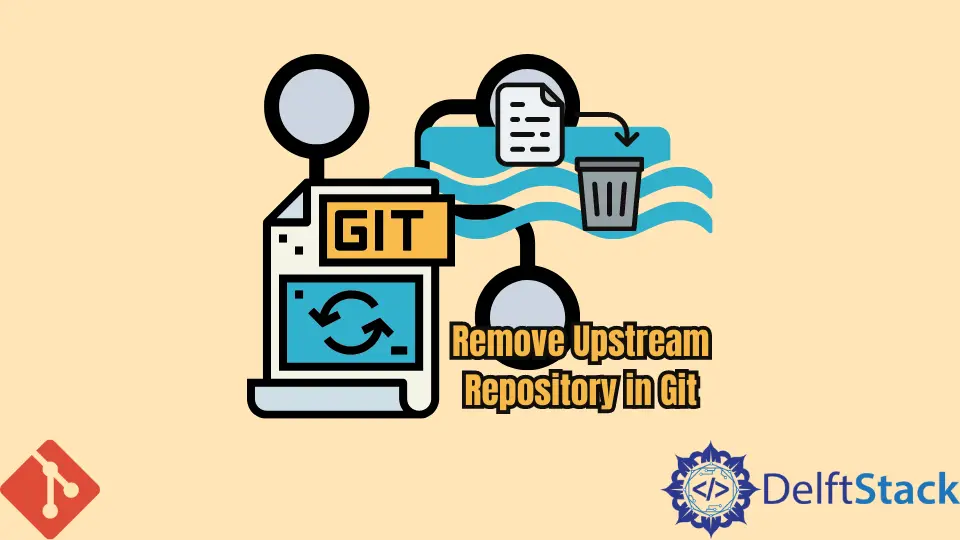How to Remove Upstream Repository in Git
- Understanding Upstream Repositories
- Removing Upstream Repository Using Git Commands
- Verifying the Removal of Upstream Repository
- Conclusion
- FAQ

Managing repositories in Git is a crucial skill for developers and teams alike. One common task is removing an upstream repository that you no longer need to track. Whether you’re cleaning up your local environment or simply changing your project’s structure, knowing how to remove an upstream repository efficiently can streamline your workflow.
In this tutorial, we will walk you through the steps to remove an upstream repository in Git. We’ll provide clear examples and explanations to ensure you understand each step. By the end of this article, you’ll be equipped with the knowledge to manage your Git repositories more effectively.
Understanding Upstream Repositories
Before diving into the removal process, it’s essential to understand what an upstream repository is. In Git, the term “upstream” refers to the original repository from which your local copy is derived. This is particularly important when collaborating on projects or contributing to open-source software. When you clone a repository, Git automatically sets the original repository as the upstream. However, there may come a time when you need to remove or change this upstream reference, and that’s where our guide comes in handy.
Removing Upstream Repository Using Git Commands
The most straightforward way to remove an upstream repository is by using Git commands. This method is suitable for users who prefer command-line operations. Here’s how you can do it:
- Open your terminal or command prompt.
- Navigate to your local repository using the
cdcommand. - Use the following command to view your current remote repositories:
git remote -v
Output:
origin https://github.com/username/repo.git (fetch)
origin https://github.com/username/repo.git (push)
upstream https://github.com/original/repo.git (fetch)
upstream https://github.com/original/repo.git (push)
This command lists all the remotes associated with your repository, including the upstream repository.
- To remove the upstream repository, use the following command:
git remote remove upstream
Output:
After executing this command, the upstream repository will be removed from your local Git configuration.
Removing the upstream repository is as simple as that! This command effectively cleans up your remote references, allowing you to focus on your own repository or set a new upstream if needed. It’s a quick and efficient way to manage your Git remotes.
Verifying the Removal of Upstream Repository
After removing the upstream repository, it’s crucial to verify that the change was successful. Here’s how you can do that:
- Again, use the command to list your remote repositories:
git remote -v
Output:
origin https://github.com/username/repo.git (fetch)
origin https://github.com/username/repo.git (push)
You should no longer see the upstream repository listed. If it has been successfully removed, you’ll only see the origin or any other remotes you have configured.
This verification step is essential because it ensures that you have a clean slate for your remote repositories. You can now add a new upstream if you’re collaborating on a different project or simply continue working on your local repository without any unnecessary references.
Conclusion
In this article, we explored how to remove an upstream repository in Git using simple command-line instructions. We discussed the importance of understanding upstream repositories and provided clear steps to ensure you can manage your Git environment effectively. Whether you’re cleaning up your project or transitioning to a new upstream, these commands will serve you well in your development journey. Remember, keeping your Git configuration tidy is essential for efficient collaboration and project management.
FAQ
-
How do I check my current remotes in Git?
You can check your current remotes by using the commandgit remote -vin your terminal. -
Can I remove multiple upstream repositories at once?
No, you need to remove each upstream repository individually using thegit remote remove <name>command. -
What happens if I remove the upstream repository?
Removing the upstream repository will not delete any of your local files; it simply removes the reference to the original repository. -
Can I add a new upstream repository after removing the old one?
Yes, you can add a new upstream repository anytime using the commandgit remote add upstream <repository-url>.
- Is removing an upstream repository reversible?
Yes, you can always add it back using thegit remote addcommand if you need to track the upstream repository again.
Related Article - Git Remote
- How to Add SSH in Git Remote
- How to Create a Remote Repository From a Local Repository in Git
- How to Synchronize a Local Repository With a Remote Repository in Git
- How to Update a Repository by Setting Up a Remote
- How to Push From an Existing Remote Repository to a Different Remote Repository in Git